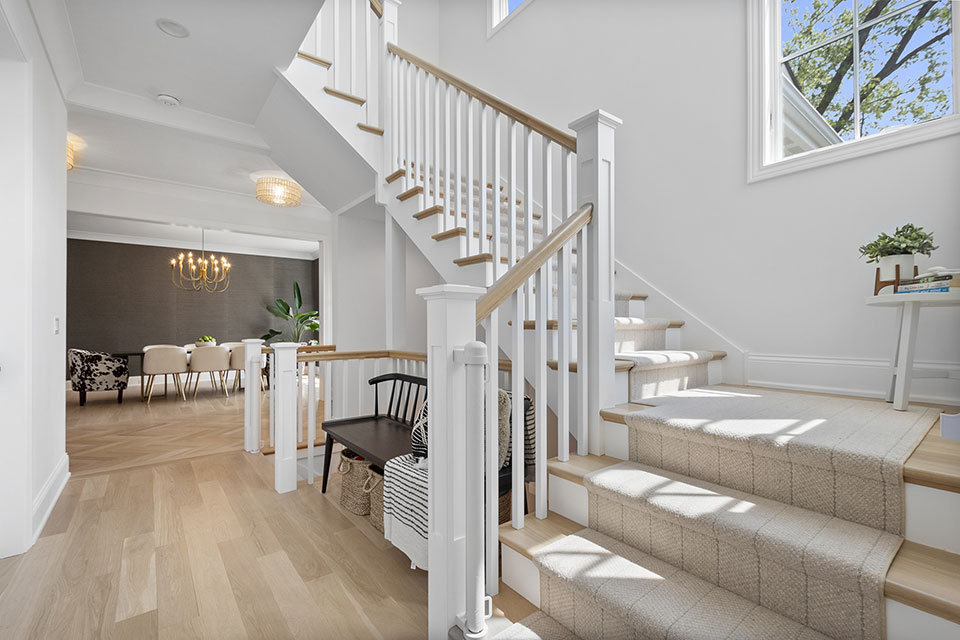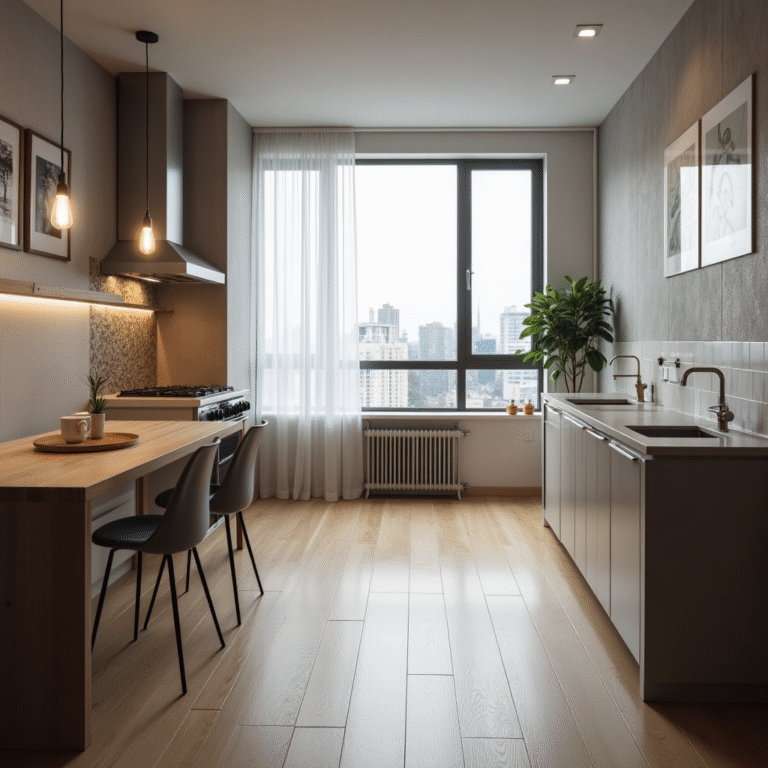
Staircasing
Staircasing refers to the process of gradually increasing your ownership in a shared ownership property until you eventually own it entirely. This method allows you to slowly expand your share, reducing rent payments and steadily building equity in the property.
Why Staircasing Matters: Unlocking Accessible Homeownership
The value of staircasing lies in its ability to make homeownership more attainable and affordable. By starting with a smaller share of a property, you can ease the financial burden upfront while working toward full ownership. Whether you’re residing in Leicester, London, or any other city, staircasing offers a clear and achievable route to increase your stake in the property, lowering rent payments and ultimately benefiting from long-term property value appreciation.
How Staircasing Works: A Simple Breakdown
Understanding Staircasing in Shared Ownership
Staircasing is most commonly seen in shared ownership schemes, where buyers acquire a portion of a property and pay rent on the remainder, which is owned by a housing association. Over time, as financial situations improve, buyers can gradually purchase more shares in the property by “staircasing.” The goal for many is to eventually own 100% of the property, at which point rent payments cease.
The Gradual Path to Complete Homeownership with Staircasing
The appeal of staircasing lies in its gradual process. Homebuyers can increase their stake in the property over time, making it financially manageable. For example, you might initially own 25% of a property and steadily increase that share until you own the home outright. This incremental approach is particularly advantageous for first-time buyers who may not have the funds for an upfront full purchase but still wish to work toward full ownership.
Why You Should Consider Staircasing: The Key Advantages
Decreasing Rent Payments
One of the most notable benefits of staircasing is the reduction in monthly rent costs. As you buy more shares, the rent on the remaining portion of the property decreases, leading to lower monthly expenses. This is particularly beneficial in areas with high rental prices like Leicester, London, or Manchester.
Building Property Equity
With staircasing, you gradually accumulate equity in your property. Each additional share purchased increases your ownership, which in turn builds your wealth. This is especially valuable if property prices are rising, as your stake in the property appreciates, bolstering your long-term financial growth.
Reaching Full Homeownership
The ultimate objective for many homeowners is full ownership, and staircasing provides a clear and systematic path to achieving this. As you continue to increase your share, you can eventually eliminate rent payments entirely, giving you full control over your property.
Long-Term Financial Security
Owning a property outright provides long-term financial stability. Once your home is fully paid for, you no longer need to worry about rent, which is a significant advantage in future financial planning, retirement savings, and wealth building.
The Staircasing Journey: Steps to Increase Your Share
Review Your Lease Terms
Before starting the staircasing process, it’s crucial to carefully review your lease agreement. Some leases may include conditions on how often you can increase your share or how much you can purchase at a time. Consulting with your housing association or a legal professional can clarify these conditions and ensure a smooth experience.
Steps to Successfully Complete Staircasing
The staircasing process involves several key steps:
- Get a Property Valuation:
You will need an updated property valuation to determine the current market value of your home, typically conducted by a RICS-certified surveyor.
- Arrange Financing:
Depending on how you plan to fund the purchase, you may need to remortgage or use savings to buy more shares.
- Hire a Solicitor:
A solicitor will help manage the legal aspects of updating your lease and transferring ownership.
- Complete the Purchase:
Once everything is set, your new ownership share will be reflected, and rent adjustments will be made accordingly.
Key Considerations: What You Should Know Before Staircasing
Costs Involved in Staircasing
There are several expenses associated with staircasing, including:
- Property Valuation Fees: A professional valuation is necessary to assess the current market price of your property.
- Legal Fees: You’ll need a solicitor to handle the legal process, including updating your lease and transferring ownership.
- Stamp Duty: Depending on the cost of the additional shares, you may need to pay stamp duty, which should be factored into your overall costs.
The Impact of Market Trends on Property Values
Property values fluctuate over time, and understanding the property market is vital when considering staircasing. By obtaining a valuation, you’ll have an accurate idea of your property’s current worth, which helps you make informed decisions about increasing your share.
The Pros and Cons of Staircasing in Today’s Market
The benefits of staircasing are clear in a growing housing market: reducing rent, building equity, and working toward full ownership. However, there are risks, such as the possibility of property values decreasing, which could slow the growth of your investment. As with any financial decision, it’s crucial to carefully assess both the potential rewards and risks.
Staircasing and Property Valuations: How They Affect Your Investment
How Property Valuations Influence Staircasing
A property valuation plays a pivotal role in the staircasing process. It determines the cost of additional shares based on the current market value. If property prices are rising, the price of buying more shares could increase, so it’s important to budget accordingly.
The Importance of Property Appraisals
A professional property appraisal, often conducted by a RICS-certified firm, ensures that you are paying a fair price for the additional shares. This process allows you to make well-informed decisions about how to finance your purchase.
Choosing a Trusted Property Valuation Service
When selecting a property valuation service, it’s essential to work with reputable providers like Rightmove, Zoopla, or other trusted property experts to ensure accurate and reliable valuations. This will give you confidence and peace of mind as you navigate the staircasing process.
Exploring Your Funding Options for Staircasing: What You Need to Know
Leveraging Remortgaging to Finance Staircasing
A popular method for financing staircasing is by remortgaging your property. This involves increasing your mortgage to cover the cost of buying additional shares. Remortgaging can be an effective strategy if interest rates are favorable and you’ve built sufficient equity in your home.
Using Your Savings to Purchase More Shares
If you have available savings, you can use them to fund your staircasing journey without taking out a mortgage. This approach allows you to avoid adding more debt, which can be especially beneficial if you prefer to minimize financial risk.
Obtaining a New Loan or Mortgage for Staircasing
Sometimes, you may need to apply for a fresh mortgage or a personal loan to finance the purchase of additional shares. Consulting with mortgage brokers or financial advisors, like those at Halifax or Nationwide, can help you find the most suitable options for staircasing.
Understanding the Legal Side of Staircasing: What You Should Expect
The Legal Process of Updating Your Lease
As you increase your ownership in the property, your lease must be updated to reflect your new share. This involves working with a solicitor to ensure all legal requirements are met. Your solicitor will also make sure any necessary rent adjustments are processed correctly.
How Solicitors and Legal Professionals Assist During Staircasing
Having the right legal guidance is crucial when staircasing. A qualified solicitor or conveyancer can help navigate the legal complexities, including updating your lease, transferring property ownership, and addressing any legal challenges that may arise.
The Future of Staircasing: Market Trends and Emerging Opportunities
The Impact of Staircasing on Future Resale Potential
One of the long-term benefits of staircasing is its positive effect on the resale value of your home. As you gradually buy more shares, you not only lower your rent but also increase your potential resale value. If property prices rise, you will benefit from increased equity when you decide to sell.
The Rising Popularity of Staircasing in Major Cities
Staircasing is gaining traction in cities with strong housing markets, such as Leicester, Birmingham, and London. These cities offer great potential for first-time buyers looking to step onto the property ladder. As property values continue to climb, staircasing provides a way to enter the market and build equity over time.
Avoiding Common Pitfalls During the Staircasing Process
Neglecting Financial or Legal Considerations
One common mistake when staircasing is not fully understanding the financial or legal implications. It’s important to consult with both property solicitors and financial advisors to ensure you’re making informed decisions every step of the way.
Failing to Thoroughly Review Your Lease Terms
Another mistake is not carefully reviewing the lease agreement. It’s essential to understand the specific conditions related to staircasing, including any limitations on how much you can purchase or the frequency of transactions allowed.
Not Accounting for Future Costs
While staircasing can be a great opportunity, it’s important to plan for long-term costs, such as property maintenance, stamp duty, and any potential increases in your mortgage payments.
Expert Advice for Navigating the Staircasing Process
Effective Strategies for Successful Staircasing
Here are some key tips to help you navigate the staircasing process successfully:
- Start Small, Think Long-Term:
Begin with a manageable share based on your current financial situation, and plan how to gradually increase your stake over time.
- Seek Guidance from Financial Advisors:
Before making any moves, consult with a financial expert to develop the right strategy. They can help you identify the best mortgage options and ensure that your staircasing journey is financially sustainable.
- Track Market Trends:
Since property prices fluctuate, it’s important to stay informed about market conditions. This helps you decide the best time to staircase further, especially if prices are low and you can secure better deals.
How Property Agents and Mortgage Advisors Can Help
A reputable property agent, such as Martin & Co or Savills, can be a valuable ally throughout the staircasing process. They offer insights into the local market, recommend ideal investment areas, and connect you with reliable mortgage providers like Barclays or Halifax. Mortgage advisors can ensure you secure the best deal available, whether you’re remortgaging, taking out a loan, or using savings to purchase additional shares.
Recommendations for First-Time Buyers Considering Staircasing
For first-time buyers, it’s essential to research affordable housing schemes like shared ownership programs. Take time to understand the associated costs, such as property maintenance, valuation fees, and legal expenses. Engaging with professionals early will help guide you through the process and ensure your financial goals align with the realities of homeownership.
Key Facts about Staircasing:
- Gradual Property Ownership:
Staircasing allows you to purchase a larger share of a property over time, eventually leading to full ownership. This incremental approach makes homeownership more accessible for many individuals, especially first-time buyers.
- Reduced Rent Payments:
As you increase your share of the property, the rent you pay on the remaining portion decreases. This can lead to significant savings in monthly rent, easing your financial burden as you move toward full ownership.
- Builds Equity:
Each time you buy more shares in the property, you build equity. This means your ownership stake grows, and if property values increase, so does your investment, benefiting your long-term wealth.
- Eligibility for Full Ownership:
The ultimate goal of staircasing is to reach 100% ownership of the property, which eliminates the need for rent payments and grants you full control over your home.
- Flexible Financing Options:
There are various ways to finance staircasing, including remortgaging your property, using savings, or securing a personal loan. This flexibility helps make the process more manageable based on your financial situation.
Conclusion: Staircasing as a Stepping Stone to Full Ownership
Staircasing offers an exciting, flexible approach to eventually becoming a homeowner, especially for those just beginning their property journey. It allows you to progressively reduce rent payments, build equity, and work toward full ownership. While there are costs involved, such as legal fees, valuation expenses, and stamp duty, the rewards of owning your property outright are substantial.
For those living in competitive housing markets like Leicester, London, or Manchester, staircasing offers a fantastic opportunity to enter the property market at an affordable level. As property prices rise, gradually increasing your stake through staircasing could prove to be a sound financial decision.
Ultimately, staircasing provides an effective means to reduce rental costs, build equity, and move toward full homeownership. With proper planning, professional advice, and a thorough understanding of the financial and legal aspects, staircasing can be a smart choice for securing your financial future.
FAQs
How can I fund my staircasing journey?
There are several ways to finance staircasing, such as by remortgaging your home, using personal savings, or taking out a new mortgage or loan. It’s highly recommended to speak with mortgage lenders or financial advisors to determine the most suitable financing option based on your circumstances.
What advantages does staircasing offer?
Staircasing helps reduce rent costs, lets you build equity in your property, and brings you closer to full ownership. It’s a financially stable way to gradually increase your stake in the property, ultimately leading to greater homeownership and long-term wealth.
Are there any hidden expenses with staircasing?
Yes, there are several costs involved, including fees for property valuation, legal services, stamp duty, and potentially higher mortgage payments. It’s crucial to factor these into your planning to ensure you’re prepared for all costs associated with staircasing.
Can I sell my shared ownership property before fully staircasing?
Yes, you’re allowed to sell your property at any point. However, how much you can sell it for will depend on the proportion of the property you own and the prevailing market conditions at the time.
When is the optimal time to increase my stake in the property?
The best time to staircase largely depends on both the state of the housing market and your financial position. Keeping an eye on property price trends and consulting with experts will help you choose the right time to increase your ownership.
Keep an eye for more latest news & updates on The Washington Vibes!



